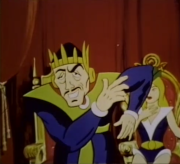Gaius Marius posted:The Guns of August and A Distant Mirror are very readable histories that are pretty deprecated at this point, but it's not like it matters to a layman. I'd point to Terry Gilliams Medieval Lives over Distant Mirror.
|
|
|
|
|

|
| # ? Jun 9, 2024 09:59 |
|
Don't forget the best single-volume history of anything - McPherson's Battle Cry of FreedomHieronymous Alloy posted:I'd point to Terry Gilliams Medieval Lives over Distant Mirror.
|
|
|
|
Yeah battle cry is really good
|
|
|
Edgar Allen Ho posted:Stalin moonlighted as a roman historian? The immortal science of Marxism-Leninism is a pathway to many abilities some consider to be unlikely
|
|
|
|
|
Is Terry Jones's book on barbarians any good?
|
|
|
|
Rubicon is bad history, but if you liked it you’ll probably also like Duncan since he’s bad history in the exact same way and even in service of the same argument. Mary Beard is a good rec for Roman popular history. Adrian Goldsworthy has a few accessible books of ancient biography and one on the fall of the western Roman empire (How Rome Fell) which is interesting. In the same vein, Peter Heather’s Fall of the Roman Empire. Kaldellis’ Streams of Gold, Rivers of Blood is really cool book about how the medieval Roman Empire poo poo the bed Battle Cry of Freedom is a great read
|
|
|
|
This is the Ancient history thread but a few years ago my dad gave me a copy of The British Are Coming which covers the first three years of the American Revolution, and I quite enjoyed it. It's written by Rick Atkinson, who is pretty well known I think for An Army at Dawn and The Day of Battle. It's eventually supposed to be three parts. I think the thing I liked the most about it is he covers the British perspective pretty well too. Lots of the times when you get a book about the American Revolution, it's nothing but George Washington did this, Ben Franklin did this, etc.
Jamwad Hilder fucked around with this message at 20:35 on Dec 13, 2023 |
|
|
|
Kaldellis' everything is really good, but not exactly light reading. Streams is at least narrative I suppose, though by that logic I would insist that your family buy you A New Roman Empire 
|
|
|
Siivola posted:Is Terry Jones's book on barbarians any good? No idea. Medieval Lives is great as is the companion BBC special.
|
|
|
|
|
Jamwad Hilder posted:This is the Ancient history thread but a few years ago my dad gave me a copy of The British Are Coming which covers the first three years of the American Revolution, and I quite enjoyed it. It's written by Rick Atkinson, who is pretty well known I think for An Army at Dawn and The Day of Battle. It's eventually supposed to be three parts. I think the thing I liked the most about it is he covers the British perspective pretty well too. Lots of the times when you get a book about the American Revolution, it's nothing but George Washington did this, Ben Franklin did this, etc.
|
|
|
|
Anti Stalin, sounds pretty unhinged to be sure
|
|
|
|
Yeah but she is good with broken pottery and the like so I let it slide
|
|
|
|
Sweetness & Power by Mintz is a pretty good, light read about sugar in the early modern period. Its not the lightest reading by Soldiers & Ghosts by Lendon is an incredible book if you find yourself getting into arguments about ancient greek/roman warfare a lot. Dawn of Everything has been well-recieved for a reason and can be breezed through pretty readily. Why You Can't Teach United States History without American Indians is an anthology work that's intended for like...high school teachers. I personally liked the earliest essays the most, had some really eye opening stuff there and some beautiful maps. Life and Society in the Hittite World is a really great overview of what we know about how the Hittites lived, it doesn't get too bogged down in any scholarly debates, save for one incredibly interesting debate ("why does the hittite law have different penalties for bestiality with dogs vs horses")
|
|
|
|
Weavers, Scribes, and Kings by Amanda Podany is a very readable, engaging and very up to date book on Ancient Mesopotamia, that mostly looks at the lives of individuals and the stories that emerge from those lives. It's maybe a bit longer than you are looking for (about 600 pages), but its not very dense despite its size.
|
|
|
|
Wow, that's so much more of a response than I was expecting. Thank you all of you, they are great and stave of the Christmas present crisis (of what do you buy a nerd for christmas) for another year.
|
|
|
|
Tulip posted:Life and Society in the Hittite World is a really great overview of what we know about how the Hittites lived, it doesn't get too bogged down in any scholarly debates, save for one incredibly interesting debate ("why does the hittite law have different penalties for bestiality with dogs vs horses") You can't say this and not elaborate 
|
|
|
|
Fuschia tude posted:You can't say this and not elaborate Didn't the previous title of this very thread reference that particular law? It lasted a long time.
|
|
|
|
CrypticFox posted:Weavers, Scribes, and Kings by Amanda Podany is a very readable, engaging and very up to date book on Ancient Mesopotamia, that mostly looks at the lives of individuals and the stories that emerge from those lives. It's maybe a bit longer than you are looking for (about 600 pages), but its not very dense despite its size. Does it cover Ea-Nasir?
|
|
|
|
Zopotantor posted:Didn't the previous title of this very thread reference that particular law? It lasted a long time. As the author of that thread title, I had forgotten it was a cross-up of that Hittite law and one of Ashoka's edicts. I just remembered the edict part. Man, that title lasted 17 months.
|
|
|
|
Zopotantor posted:Does it cover Ea-Nasir? Only briefly, unfortunately, but it does cover a lot of other equally fascinating figures like Ea-Nasir. If you like the story of Ea-Nasir, I would recommend the book, since Ea-Nasir is far from the only person from Ancient Mesopotamia whose sordid personal life is well documented.
|
|
|
|
Fuschia tude posted:You can't say this and not elaborate So the short answer is "we don't know and likely never will." The longer answer is that we have a lot of surviving Hittite law but not a lot of surviving Hittite legal philosophy. Zooming out a little bit, in Hittite law is somewhat unusual in that local law generally supersedes imperial law. So if you were in say the Lukka region and committed a crime, chances are your punishment would be based on Lukka considerations rather than Hittite ones, unless it was only a crime under Hittite law. I bring this up because there is one place where Hittite code superseded all local laws, which is incest regulations. The Hittites took extreme umbrage with incest, willing to threaten their own vassal-kings with execution over it. It is a significant exception: the Hittites were pretty blase about things like blasphemy or insulting the king or theft or murder, but sexual stuff they loving meant it. Anyway, in the Hittite legal code, bestiality is a capital crime, you can get executed for it. Unless the animal you had sex with was a horse or mule. Which sometimes people over-interpret as meaning that having sex with a horse or mule was a-ok, but it was still a crime and still so polluting you were not allowed to plead your case directly to the emperor (since your very presence would be polluting). It just was a lesser punishment than if you had sex with a dog, pig, or sheep. Now, back to the top, we don't have any surviving explanations for this. We do not have a Hittite writing that comes out and says "horses are less icky than pigs." Just...nothing. So there's a lot of speculation about this - horses (and by extension mules) are upper class, or there are Indo-European derived myths that included horse-loving that got down to the Hittites, or a specific guy at one point in history who hosed a horse got a carveout because he was too important to kill, etc, but we don't actually have anything from the Hittites themselves clarifying it. Just a legal code where one form of bestiality is a death sentence and another form is a huge series of other non-lethal penalties.
|
|
|
|
We do have an inscription suggesting the first Hittite king's name was "Mr Hands", however.
|
|
|
|
Whitewashing the reputations of maligned Roman emperors seems to be fairly common, but are/were there any "Actually Trajan* sucked and was the worst ever" takes? *or some other universally-adored emperor
|
|
|
|
I think it's fairly mainstream to say that Trajan conquered first and worried about whether the land was even worth conquering later, which is a fairly major criticism, even if it isn't all the way to "actually he sucked"
|
|
|
|
Gen. Ripper posted:Whitewashing the reputations of maligned Roman emperors seems to be fairly common, but are/were there any "Actually Trajan* sucked and was the worst ever" takes? Trajan was indeed bad. He was a warmonger who overextended the Empire's territory; Hadrian had to give up some of the territory Trajan conquered for the sake of more defensible borders. Edit: cheetah7071 beat me to it.
|
|
|
|
One could paint a picture of Augustus as a bloodsoaked strongman who only stabilized the empire long term by having the good fortune to outlive anybody who remembered a time before he was in charge
|
|
|
|
Gen. Ripper posted:Whitewashing the reputations of maligned Roman emperors seems to be fairly common, but are/were there any "Actually Trajan* sucked and was the worst ever" takes? Bret Deveraux posted:
https://acoup.blog/2021/07/30/collections-the-queens-latin-or-who-were-the-romans-part-v-saving-and-losing-an-empire/
|
|
|
|
cheetah7071 posted:I think it's fairly mainstream to say that Trajan conquered first and worried about whether the land was even worth conquering later, which is a fairly major criticism, even if it isn't all the way to "actually he sucked" Trajan definitely benefitted from dying basically within a year or two of his big eastern conquests and Hadrian immediately realizing how terrible an idea they were and pulling out before they blew up in everyone’s face. A timeline where Trajan lived longer or Hadrian wasn’t his successor would not have as kind of a historiography.
|
|
|
|
I’m not sure you could say Diocletian or Augustus are “universally adored”. Except by their courtiers, during their lifetimes. Like there’s an entire ecclesiastical history tradition (sponsored by the Constantinians) about just how poo poo Diocletian was. Or like, Tacitus accuses Augustus of being blood soaked strongman who forcibly outlived everyone who could second-guess him. Very passive aggressively of course. Hardly any emperors have a “universally adored” status really. It’s one of the interesting things about the imperial system, there exist ancient traditions hostile to pretty much all of them and if there aren’t for some reason then moderns can easily supply them. Trajan escaped a lot of it in antiquity because he was able to avoid starting poo poo with the history-writing class. He got favorable report from Cassius Dio 100 years down the line in a way more hosed up political scene where you had to survive a lot of purges to make it to the kind of positions Dio did. Its hard to avoid feeling that he was describing the kind of boss he wished he had, a good old alcoholic pederast who didn’t constantly massacre guys like himself and instead spent his time achieving military glories that didn’t last.
|
|
|
|
I have a half-baked hot take that maybe the emperors who saved the empire are bad because maybe if the empire failed faster then the successor states could've bounced back faster or harder or something. It's mostly contrarian. Anyway, Zeno also really sucked as an emperor. Now if you're looking for a cool dude Emperor, there's Carausius. He was great.
|
|
|
|
SlothfulCobra posted:I have a half-baked hot take that maybe the emperors who saved the empire are bad because maybe if the empire failed faster then the successor states could've bounced back faster or harder or something. It's mostly contrarian. Anyway, Zeno also really sucked as an emperor. Aurelian took Zenobia away from us and she was loving awesome
|
|
|
|
FWIW so far as I've gotten in The New Rome Kaldelis seems to be moderately positive about lots of Diocletian's reforms and frames them as being fundamental for the long-term stability of the Eastern Empire, particularly his expansion of the bureaucracy and changing the taxation system.
|
|
|
|
skasion posted:I’m not sure you could say Diocletian or Augustus are “universally adored”. Except by their courtiers, during their lifetimes. Like there’s an entire ecclesiastical history tradition (sponsored by the Constantinians) about just how poo poo Diocletian was. Or like, Tacitus accuses Augustus of being blood soaked strongman who forcibly outlived everyone who could second-guess him. Very passive aggressively of course. We've had a good 2000 years of weird contrarians to come up with every single take about the empire, true universality is not I think a reasonable expectation. There are however definitely emperors who have a better reputation than others, and its worth engaging with the question of "what are some contrarian takes on generally considered good emperors" in good faith, because it helps us engage with how we think about what makes an emperor good vs bad, or indeed if we even want to consider emperors to be good, since they're y'know emperors. CommonShore posted:FWIW so far as I've gotten in The New Rome Kaldelis seems to be moderately positive about lots of Diocletian's reforms and frames them as being fundamental for the long-term stability of the Eastern Empire, particularly his expansion of the bureaucracy and changing the taxation system. Right. Most people consider him to be a good emperor, specifically for those reasons. Bret Deveraux considers those reforms to be largely counterproductive, and it's an atypical take on the guy.
|
|
|
|
Tulip posted:We've had a good 2000 years of weird contrarians to come up with every single take about the empire, true universality is not I think a reasonable expectation. There are however definitely emperors who have a better reputation than others, and its worth engaging with the question of "what are some contrarian takes on generally considered good emperors" in good faith, because it helps us engage with how we think about what makes an emperor good vs bad, or indeed if we even want to consider emperors to be good, since they're y'know emperors.
|
|
|
|
So from a lay perspective it seems like modern study of Rome starts with Gibbon and goes from there. Obviously there's much more to it than that, but what was it like before that? Were there any books to work form? How would someone like Gibbon start to piece together their timeline? Was it learn Latin and start reading primary sources or were other books in existence that he built off.
|
|
|
|
Cast_No_Shadow posted:So from a lay perspective it seems like modern study of Rome starts with Gibbon and goes from there. Obviously there's much more to it than that, but what was it like before that? Were there any books to work form? How would someone like Gibbon start to piece together their timeline? Gibbon had almost all the same literary sources that we do (he also had Ossian who turned out to be a modern fraud playing on British national insecurity, oops) but way less epigraphy and hardly any archaeological evidence worth poo poo. The concept of archaeology itself was only just emerging, Pompeii was still mostly in the ground and the Corpus Inscriptionem Latinarem was 50 years away. As far as I understand, Gibbon was not usually going out and arranging and comparing manuscripts himself—this work had already been started by Renaissance humanists but it was still going on up to a little before his time. He cites Johann Albert Fabricius’ Bibliotecha Latina (from a couple generations before) as his authority for the Historia Augusta’s textual problems. Or the edition of Cassius Dio that he uses for example was a relatively fresh book assembled by Fabricius’ protege, it had only been out for like 10-20 years (Dio is fragmentary and his book as we have it today is assembled from quotations in Constantine Porphyrogenitus + Byzantine epitomes). Which is to say there was a good amount of Latin and Greek scholarship out there already, and even a good bit of what would have been called “oriental studies”. If you can find an edition of Decline and Fall with footnotes he cites quite a lot of other contemporary writers. Gibbon was not out of nowhere, but he was a watershed moment for 18th century classicism, and he did it in English, sourced and translated his quotes, and did so to make a clear argument in a very comprehensive manner, studying a hitherto unfashionable period.
|
|
|
Zopotantor posted:Does it cover Ea-Nasir? There was good Twitter thread on Ea-Nasir recently, arguing that he had been misunderstood: https://twitter.com/AANDeloucas/status/1464734501779787776 https://threadreaderapp.com/thread/1464734501779787776.html
|
|
|
|
|
Kind of on the topic of Ea-Nasir but not directly: how does a house with business correspondence just get abandoned and left for nearly four thousand years? I get how a sudden catastrophe (Pompeii most famously, but floods could do the same I suppose) could leave a city buried and uninhabitable, waiting to be unearthed in a later age, but as I understand it that's not the case with Ur. People just...walked away? How did nobody move into Ea-Nasir's house and repurpose it for themselves? I understand that properly-fired clay tablets can last approximately forever as long as nobody hits them with a hammer, so my question is less "how did the complaint tablet survive" and more "why did nobody throw away all of Ea-Nasir's stuff and move into his house."
|
|
|
|
Kylaer posted:Kind of on the topic of Ea-Nasir but not directly: how does a house with business correspondence just get abandoned and left for nearly four thousand years? I get how a sudden catastrophe (Pompeii most famously, but floods could do the same I suppose) could leave a city buried and uninhabitable, waiting to be unearthed in a later age, but as I understand it that's not the case with Ur. People just...walked away? How did nobody move into Ea-Nasir's house and repurpose it for themselves? I understand that properly-fired clay tablets can last approximately forever as long as nobody hits them with a hammer, so my question is less "how did the complaint tablet survive" and more "why did nobody throw away all of Ea-Nasir's stuff and move into his house." Gonna assume that the feature that made the house desirable was no longer there. Perhaps the house was within easy walking of a spring or canal?
|
|
|
|

|
| # ? Jun 9, 2024 09:59 |
|
Believe it or not, all the copper got ripped off
|
|
|














 Yes, it's like a lava lamp.
Yes, it's like a lava lamp.






























